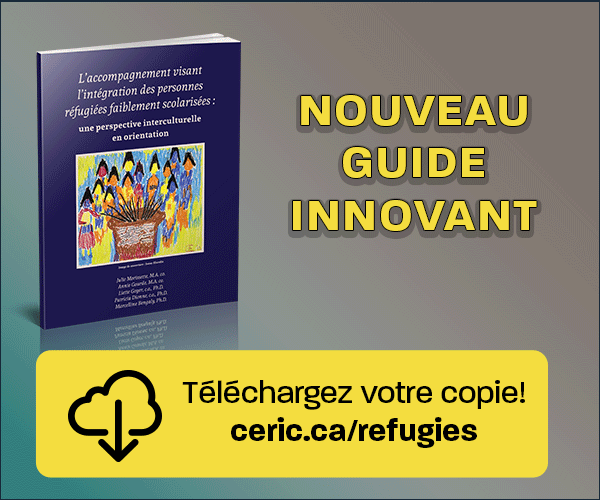Identité professionnelle et évolution de carrière : une analyse détaillée de l'Église d'Angleterre
Mots-clés :
higher education professional identity, organizational citizen behavior, church of england, organizational-professional conflict, developmental perspectives, collaborative partnershipsRésumé
Academic Programme Directors can be identified within non-traditional Higher Educational (HE) contexts such as the case study of the Church of England. The purpose of this paper is to explore the professional identity and career progression of such Academic Programme Directors. A descriptive analysis was conducted of all the Curacy/Academic Programme Directors in the Church of England. This was done to evaluate whether HE organisational citizenship behaviour (OCB) as a means of professional identity existed and whether this influenced HE career development. The data from this case study revealed that a HE professional identity is not a priority due to the priestly identity and career development taking precedence. The case study of a non-traditional HE context is an example of competing identities. Conflicting and competing identities within HE may lead to a low OCB which may lead to high turnover intentions.
Références
Advisory Board of Ministry. (1991). Ordinations and the Church’s Ministry. Paper no. 22. London: Church of England Advisory Board of Ministry.
Advisory Board of Ministry. (1995). Mixed Mode Training. Paper no. 10. London: Church House Publishing.
Advisory Board of Ministry. (1997). Issues in Theological Education and Training. Paper no.15. London: Church House.
Advisory Board of Ministry. (1998). Beginning Public Ministry. Paper no. 17. London: Church of England Advisory Board of Ministry.
Advisory Council for the Church’s Ministry. (1982). Learning and Teaching in Theological Education: issued in conjunction with the Board of Education. Paper no. 11. London: Church of England Advisory Council for Ministry.
Advisory Council for the Church’s Ministry. (1987a). Theological Education Today. Paper no. 15. London: Church of England Advisory Council for Ministry.
Advisory Council for the Church’s Ministry. (1987b). Theological Education Today: A speech by the Archbishop of Canterbury. Paper no. 25, (May). London: Church of England Advisory Council for Ministry.
Advisory Council for the Church’s Ministry. (1987c). Education for the Church’s Ministry: the Report of the Working Party on Assessment. Paper no. 22. London: Church of England Advisory Council for Ministry.
Archbishops Council. (2001). Mind the Gap. London: Church House Publishing.
Archbishops Council. (2015). Resourcing Ministerial Education in the Church of England. GS 1979. London: General Synod of the Church of England.
Bailey, M. (2011). Policy, professionalism, professionality and the development of HR practitioners in the UK. Journal of European Industrial Training, 35 (5), 487-501.
Ballard, P. (2004). Reflections on Professional Theological Education Today. Theology, Sept/Oct, CVII (839), 333-342.
Billings, A. (2010). Making God Possible. London: SPCK.
Bryman, A. (1985). Professionalism and the Clergy: A research note. Review of Religious Research, 26 (3), 253-260.
Burgess, N. (1998). Into Deep Water. Bury St. Edmunds: Kevin Mayhew.
Caminer, M. (2014, February 7). Curacies: what is wrong and how to rectify it. Church Times. 16, 43.
Christou, S. (2009). Images of Formation. Cambridge: Phoenix Books.
Church of England. (2003). Guidelines for the Professional Conduct of the Clergy. London: Church House Publishing.
Church of England. (2006). Clergy Discipline Measure 2003. London: Church House Publishing.
Church of England. (2009a). Ecclesiastical Offices (terms of service) Measure 2009. London: Church House Publishing.
Church of England. (2010a). Criteria for Selection for Ordained Ministry in the Church of England. London: Ministry Division for the Archbishops’ Council.
Church of England. (2010b). Formation and Assessment in Curacy. Retrieved June 21, 2013, From http://www.churchofengland.org/media/56875/formation%20and%20assessment%20in%20curacy.doc
Church of England. (n.d.). About Us. Retrieved June 20, 2013, from https://www.churchofengland.org/about-us/dioceses.aspx
Church of England. (n.d.). Curacy Assessment Grids. Retrieved June 21, 2013, from http://www.churchofengland.org/media/56871/Assessment%20grid%20for%20potenial%20incumbents.doc
Church of England. (n.d.) Vocations Magazine. Retrieved November 11, 2013, from http://www.callwaiting.org.uk
Cohen, A. and Kol, Y. (2004). Professionalism and organizational citizenship behaviour: An empirical examination among Israeli nurses. Journal of Managerial Psychology, 19 (4), 386-405.
Collini, S. (2012). What Are Universities For? London: Penguin Books.
Crook, D (2008). Some historical perspectives on professionalism. In B. Cunningham (Ed), Exploring Professionalism (Ch.2). London: Institute of Education.
Dewar, F. (1991). Called or Collared? London: SPCK.
Dewey, J. ([1916] 1966). How we think: A restatement of the revelation of reflective thinking to the educative process. Boston: D.C. Heath & Company.
Diocese of Rochester. (2014/15). Handbook for Training Incumbents and Assistant Curates 2014/15. Retrieved March 18, 2014, from www.rochester.anglican.org
Edwards, W.J. (2012). Exploring Curate Supervision. Masters Dissertation, University of Canterbury Christ Church.
Gerhardt, T. (2015). The academic tail wagging the curacy dog: a theology of learning and formation. In B. Hazel and H. Worsley (Eds.), Being Christian in Education (Ch.9). Norwich: Canterbury Press.
Gerhardt, T. (2015). The link between the training of curates in the Church of England and their future ministry and the nature of that relationship: nationally competent and deployable? PhD dissertation, University of Canterbury Christ Church (unpublished).
Gribben, J. (2001). Screen Idol. In G. Guiver (Ed.). Priests in a People’s Church. London:SPCK.
Grundy, M. (2003). What they don’t teach you at theological college: a practical guide to life in the ministry. Norwich: Canterbury Press.
Haig, A. (1984). The Victorian Clergy. Beckenham: Croom Helm.
Hall, R.H. (1968). Professionalism and bureaucratization, American Sociological Review. 33,92-104.
Harvey, L. (2014). Stories of Being a Curate. In J. Ross-McNairn and S. Barron (Eds.), Being a Curate (Ch. 4). London: SPCK.
Heywood, D. (2000). A New Paradigm for Theological Education? Anvil, 17(1), 19-27.
Heywood, D. (2011). Reimagining Ministry. London: SCM Press.
Hill, C. (2010). Clergy discipline and pastoral care: Bishop’s mitre or judge’s wig? Theology. CXIII (874), 254-259.
Jacoby, M. G. (2002). Kierkegaard on truth. Religious Studies, MaRCH. 38 (1), 27-44 Cambridge Journals. Retrieved January 24, 2013, from http://journals.cambridge.org/abstract_S0034412501005868
Kean, R. (2014). Stories of Being a Curate. In J. Ross-McNairn and S. Barron (Eds.), Being a Curate (Ch.10). London: SPCK.
Lamdin, K. and Tilley, D. (2007). Supporting New Ministers in the Local Church: A Handbook. London: SPCK.
Lamont, R. (2011). Leaping the Vicarage Wall. London: Continuum.
Latham, R.M. (2012). The Making of Priests, MA dissertation, University of Birmingham.
Longden, L.P. (2012). Mission-Shaped Curacy? Reshaping Curacy for Effective Formation for Authentic Ministry in the Twenty-First Century Church of England, PhD dissertation, University of Birmingham.
Merrill, B. and West, L. (2009). Using Biographical Methods in Social Research. London: SAGE.
Ministry Division. (2003a). Formation for Ministry within a Learning Church. London: Church House Publishing.
Ministry Division. (2003b). Formation for Ministry within a Learning Church: Summary. London: Church House Publishing.
Ministry Division. (2006). Shaping the Future: New Patterns of Training for Lay and Ordained. London: Church House Publishing.
Ministry Division. (2011). The Trajectory of Vocation from Bishop’s Advisory Panel to First Incumbency. London: Church House Publishing.
Ministry Division. (2014). Formation Criteria for ordained ministry May 2014 (approved by House of Bishops December 2014). Retrieved April 15, 2015, from http://www.cofeministry.org.uk/
Palin, L. (2014). Stories of Being a Curate. In J. Ross-McNairn and S. Barron (Eds.), Being a Curate (Ch.14). London: SPCK.
Papadopulos, N. (2007). Shepherd and Judge: A theological response to the clergy discipline measure 2003. Theology. CX (858), 403-410.
Perham, M. (2014). Ordination and First Steps. In J. Ross-McNairn and S. Barron (Eds.), Being a Curate. London: SPCK: Ch.3.
Redfern, A. (1999). Ministry and Priesthood. London: Darton Longman Todd.
Rogers, M. (2012). Contextualizing Theories and Practices of Bricolage Research. Retrieved June 11, 2015, from www.nova.edu/ssss/QR/QR17/rogers.pdf
Rooms, N. and Steen, J. (2008). Employed by God? Theological and Practical Implications of the new Church of England Clergy Terms of Service Legislation. Cambridge: Grove Books.
Ross-McNairn, J. (2014). An ordinand’s story. In J. Ross-McNairn and S. Barron (Eds.), Being a Curate (Ch.1). London: SPCK.
Ross-McNairm, J. and Barron, S. (2014). Being a Curate. London: SPCK.
Russell, A. (1980). The Clerical Profession. London: SPCK.
Schwandt (2007). Dictionary of Qualitative Inquiry. 2nd ed. London: SAGE.
Sejjaaka, S.K. and Kaawaase, T.K. (2014). Professionalism, rewards, job satisfaction and organizational commitment amongst accounting professionals in Uganda. Journal of Accounting in Emerging Economies. 4 (2),134-157.
Shafer, W.E. (2002). Professionalism, organizational-professional conflict and work outcomes: A study of certified management accountants. Accounting, Auditing & Accountability Journal. 15 (1), 46-68.
Snizek,W.E. (1972). Hall’s Professional Scale: An Empirical Reassessment. American Sociological Review. 37 (1), 109-114.
Swinton, J. (2011). The Wisdom of L’Arche and the Practices of Care: Disability, Professional Wisdom and Encounter-in-community. In L. Bondi, D. Carr, C. Clark, and C. Clegg (Eds.). Towards Professional Wisdom: Practical Deliberation in the People Professions (Ch.10). Farnham: Ashgate.
Tomlinson, J.W.B. (2007). ‘From Parson to Professional: The Changing Ministry of the Anglican Clergy in Staffordshire, 1830-1960’, PhD dissertation, University of Birmingham.
University of Durham (2014). The Common Awards in Theology, Ministry and Mission. Retrieved may 10, 2014, from https://www.dur.ac.uk/resources/common.awards/2015_07_03_Diploma_prog_specs.pdf
@Westcott House (2012). Retrieved September 4, 2012, from www.twitter.com
Williams, D. (2007). Parsons, Priests or Professionals? Transforming the Nineteenth-Century Anglican Clergy. Theology, 110 (6), 433-442.
Worsley, H. (2014). Dealing with Thorny Issues. In J. Ross-McNairn and S. Barron (Eds.), Being a Curate (Ch.22). London: SPCK.

Téléchargements
Publié-e
Comment citer
Numéro
Rubrique
Licence
(c) Tous droits réservés REVUE CANADIENNE DE DÉVELOPPEMENT DE CARRIÈRE 2019

Cette œuvre est sous licence Creative Commons Attribution - Pas d'Utilisation Commerciale - Pas de Modification 4.0 International.











